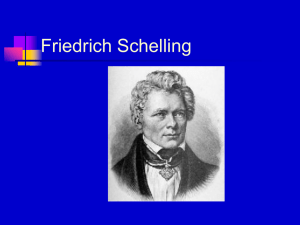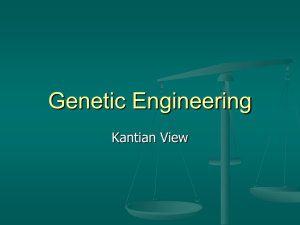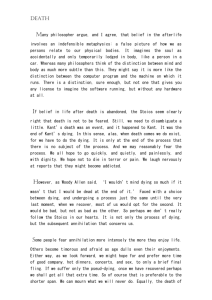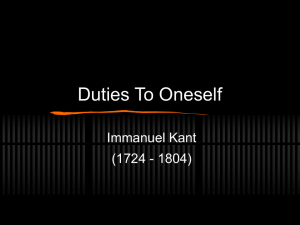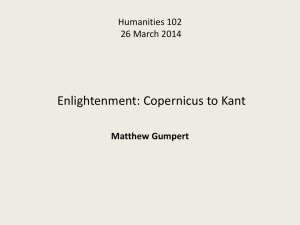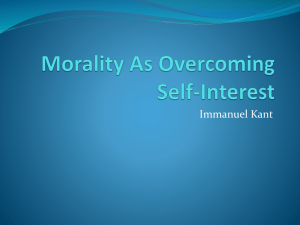Some thoughts on Essay 3 in Dialectical Logic
advertisement
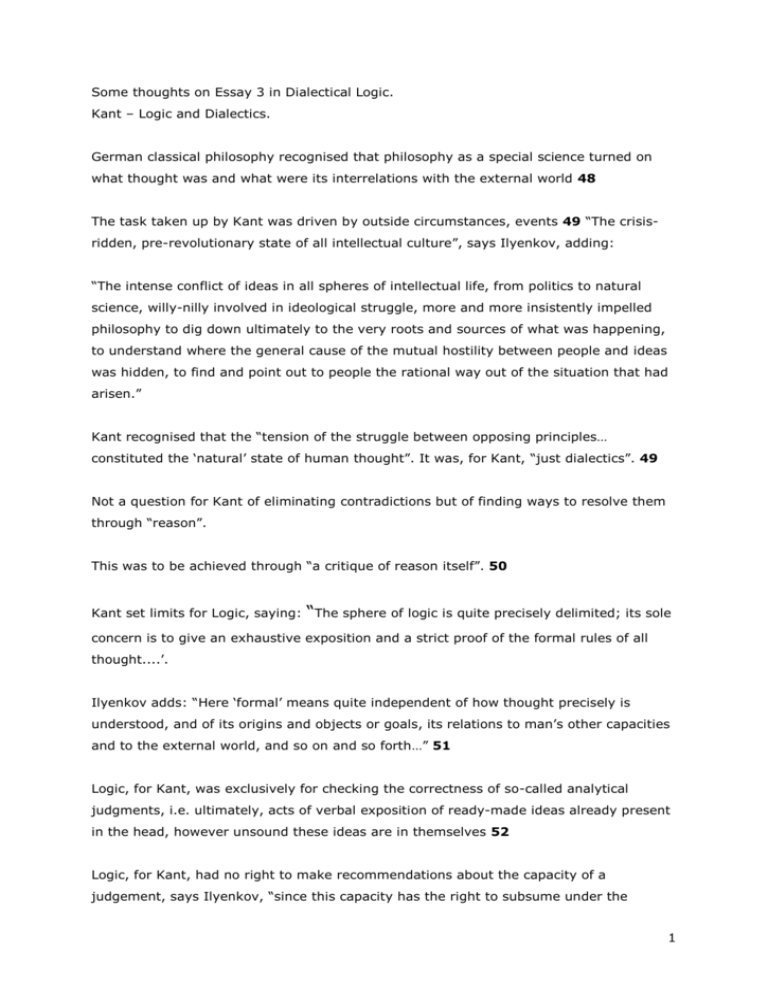
Some thoughts on Essay 3 in Dialectical Logic. Kant – Logic and Dialectics. German classical philosophy recognised that philosophy as a special science turned on what thought was and what were its interrelations with the external world 48 The task taken up by Kant was driven by outside circumstances, events 49 “The crisisridden, pre-revolutionary state of all intellectual culture”, says Ilyenkov, adding: “The intense conflict of ideas in all spheres of intellectual life, from politics to natural science, willy-nilly involved in ideological struggle, more and more insistently impelled philosophy to dig down ultimately to the very roots and sources of what was happening, to understand where the general cause of the mutual hostility between people and ideas was hidden, to find and point out to people the rational way out of the situation that had arisen.” Kant recognised that the “tension of the struggle between opposing principles… constituted the ‘natural’ state of human thought”. It was, for Kant, “just dialectics”. 49 Not a question for Kant of eliminating contradictions but of finding ways to resolve them through “reason”. This was to be achieved through “a critique of reason itself”. 50 Kant set limits for Logic, saying: “The sphere of logic is quite precisely delimited; its sole concern is to give an exhaustive exposition and a strict proof of the formal rules of all thought....’. Ilyenkov adds: “Here ‘formal’ means quite independent of how thought precisely is understood, and of its origins and objects or goals, its relations to man’s other capacities and to the external world, and so on and so forth…” 51 Logic, for Kant, was exclusively for checking the correctness of so-called analytical judgments, i.e. ultimately, acts of verbal exposition of ready-made ideas already present in the head, however unsound these ideas are in themselves 52 Logic, for Kant, had no right to make recommendations about the capacity of a judgement, says Ilyenkov, “since this capacity has the right to subsume under the 1 definition of a concept those facts that directly and immediately contradict that definition”. 54 Kant’s approach contrasts a concept with empirical practice. The determinations of concepts must be characterised by universality and necessity and given in a way that they “cannot be refuted by any future experience” (Ilyenkov). So Ilyenkov asks: “Are concepts possible that express not only and not simply more or less chance common attributes, which in another place and another time may not be present, but also the ‘substance’ itself, the very ‘nature’ of the given kind of object, the law of their existence?” 55 For Kant, analysis consisted of arranging ready ideas and concepts. Synthesis served as an act of producing new concepts. 58 Hence Kant also believed that there must be a section of logic that dealt specially with the producing “universal, necessary, and thus objective judgements”. 58 Kant in essence affirmed that the “really universal initial and fundamental logical forms” were true only insofar as they agreed with “the propositions relating to the synthesis of determinations in the composition of a concept and judgment”. Ilyenkov describes this as a “complete revolution in views on the subject matter of logic as the science of thought”, saying: “Kant was the first to begin to see the main logical forms of thinking in categories thus including everything in the subject matter of logic that all preceding tradition had put into the competence of ontology and metaphysics, and never into that of logic.” 59 Kant: “The logical functions of all judgments are but various modes of uniting representations in consciousness. But if they serve for concepts, they are concepts of their necessary union in a consciousness, and so principles of objectively valid judgments.” 59/60 The definitions of categories were understood by Kant as the principles of linking “ideas together in ‘objective’ judgements”, says Ilyenkov 60 Kant says “we cannot think of an object save through categories”. 2 It was Kant, says Ilyenkov, who first saw the main essence of logic in categorical definitions of knowledge, and began to understand logic primarily as the systematic exposition of categories, universal and necessary concepts characterising an object in general. 61 Ilyenkov adds: “At the same time, and this is linked with the very essence of Kant’s conception, categories were nothing other than universal forms (schemas) of the cognitive activity of the subject, purely logical forms of thinking.” According to Kant, categories were thus purely logical forms, says Ilyenkov 63, adding: “Kant expressed this idea in his own manner, affirming that it was impossible in any case to understand categories as abstract determinations of things in themselves as they existed outside the consciousness of people and outside experience. They characterised, in a universal (abstract-universal) way only the conceivable object, i.e. the external world as and how we of necessity thought of it, as and how it was represented in consciousness after being refracted through the prism of our sense organs and forms of thinking. “Transcendental logic, therefore, the logic of truth, was logic, and only logic, only the doctrine of thinking. Its concepts (categories) told us absolutely nothing about how matters stood in the world outside experience, whether in the world of the ‘transcendental’ outside the bounds of experience, there was causality, necessity, and chance, quantitative and qualitative differences, a difference in the probability and inevitability of an event occurring, and so on and so forth. That question Kant thought it impossible to answer; but in the world as given to us by experience matters stood exactly as logic pictured them, and science needed nothing more.” 63 Thus logic was limited to sense perceptions and it was impossible to answer “how matters stood in the world outside experience”. The thing-in-itself was essentially unknowable. Kant’s approach, says Ilyenkov, “was converted into a basic thesis of agnosticism, into an affirmation that it was impossible in general to construct a unified, scientifically substantiated picture of the world even relatively satisfactory for a given moment of time”. 64 3 Because, adds Ilyenkov, such a picture would smashed by “immanent contradictions” which was the equivalent for Kant of “its being false”. Ilyenkov praises Kant’s contribution to the development of logic: “Kant’s analysis showed that dialectics was a necessary form of intellectual activity, characteristic precisely of thinking concerned with solving the highest synthetic problems and with constructing a theory claiming universal significance, and so objectivity (in Kant’s sense). Kant thus weaned dialectics, as Hegel put it, of its seeming arbitrariness and showed its absolute necessity for theoretical thinking.” 71 4



